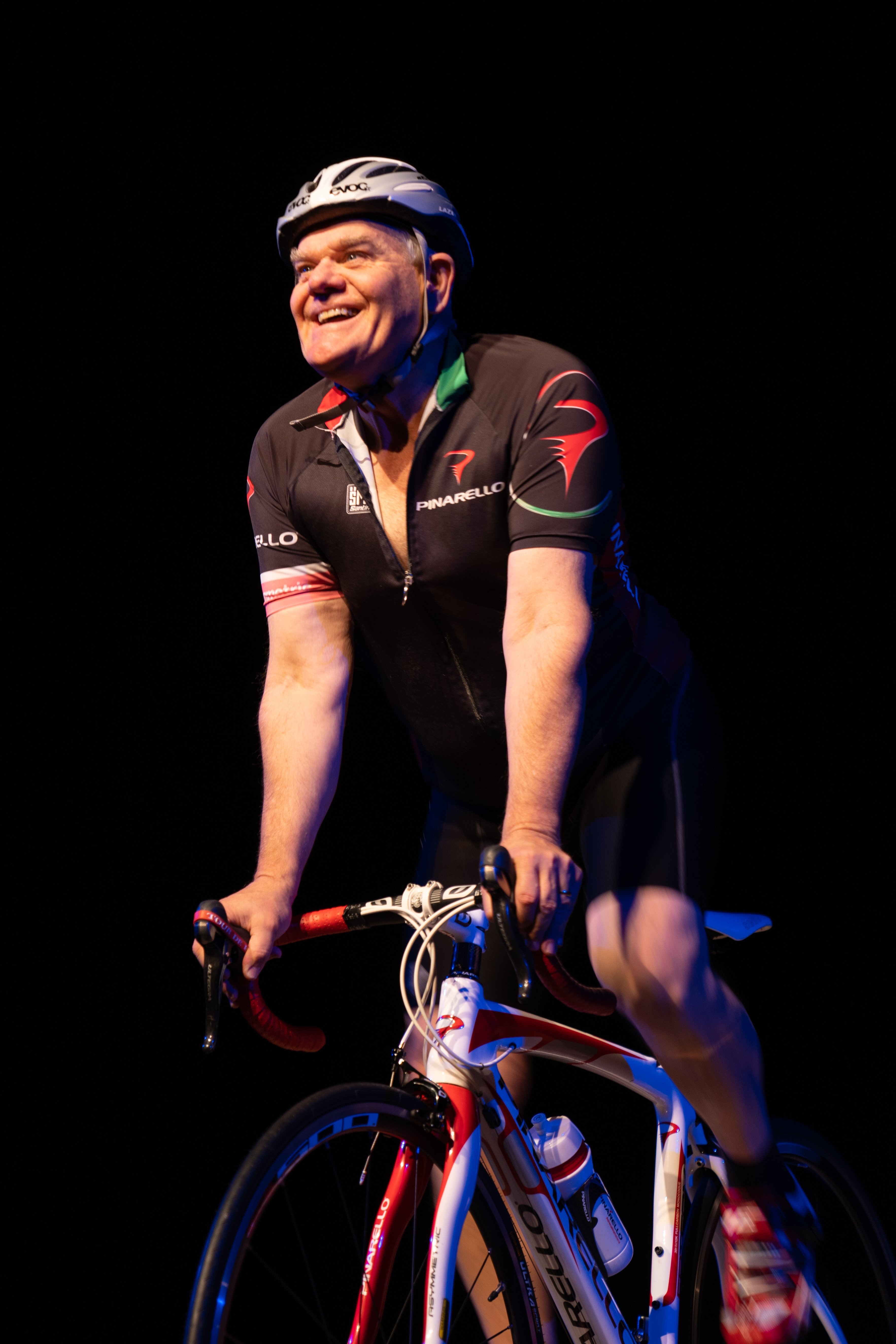Acclaimed New Zealand actor Mark Hadlow is back on his bike for his latest play, coming to Dunedin, Invercargill and Oamaru this month. Tim Scott catches up with the peloton.
There are some very good reasons why people should wear Lycra, according to actor Mark Hadlow.
‘‘Number one: no chafing.
‘‘It’s absolutely, absolutely imperative.’’
Wind resistance is another important factor.

He says people even used to turn up to his shows wearing Lycra.
‘‘People think that Lycra is just a fad. There is really, really, really some very, very good reasons to wear Lycra.’’
The Nelson-based actor, known for his role as Dori the dwarf in Sir Peter Jackson’s The Hobbit trilogy and for 2005’s King Kong, is bringing his new one-man show Gomil (Grumpy Old Man in Lycra) to Dunedin’s Regent Theatre this month.
Written and directed by Gregory Cooper, it is a sequel to his play Mamil (Middle Aged Man in Lycra).
Set around the results of the global financial crisis of 2008, that play followed property developer Bryan, who joins a peloton in a bid to improve his health.
Hadlow rides atop a stationary road bike for the show’s duration, switching between several characters.
The idea for Mamil came to him around the same time he was filming The Hobbit: An Unexpected Journey in Wellington, Hadlow says.
He and a friend had joined a small peloton and would go cycling together, once or twice a week.
‘‘He lent me his second road bike and I borrowed his Lycra - which is something you never admit to, but I did.
‘‘I had about half a dozen rides with them, and what really got me was the conversations that were happening.
‘‘Conversations about their relationships, their business relationships, their mental health, their business health - all these things that they talked about, freely and openly and sometimes in a jovial fashion.
‘‘But all of the conversation revolved around the group talking about an issue and even coming up with some solving of the issues that existed.’’
A reading of the play’s first draft was performed at Christchurch’s The Court Theatre in 2014 to a full house.
Mamil went on to do ‘‘huge business’’.
Hadlow says he performed it 350 times over eight years.
‘‘It struck a note and packed a bit of a punch.’’
It was about five years ago talk of a sequel began.
Of all the characters he played in Mamil, Hadlow says Wayne seemed the most appealing.
Gomil follows the journey of Wayne, the founder and team leader of the men’s cycling group in Mamil.
A lot has happened to him during the past 10 years - he has retired, his son has moved to London with his grandchildren, and his wife of 49 years suddenly died a year ago.
A panic attack mid-ride and a catastrophic crash rocks Wayne’s cycling confidence, and it takes a host of characters to help him rediscover what is truly important and get him back on the bike.
Hadlow says some of the ‘‘really tragic’’ events that happen to Wayne in Gomil affect a huge proportion of the older male population.
‘‘The message this time is about ‘you're not on your own’.
‘‘No matter how bad things get, there's always a chance for someone you can reach out and talk to.’’
New Zealand men, particularly 15 or 20 years ago, were not necessarily good at talking about their issues, he says.
‘‘And I still think it's the same. I think men find it very hard to talk about things.’’
Gomil is a little more emotional and psychological than Mamil, from the perspective of understanding the older male psyche.
The challenges Wayne went through are not made fun of, and they are very careful not to alienate the generation being depicted on stage.
‘‘Because I'm part of that generation anyway, so I can talk about it with some experience.’’
The humour arises from Wayne’s ability to not accept things at face value, and culminates with him accepting who he is.
Hadlow, 68, says he is now 12 years older than when he started Mamil, so there was already an authenticity to the way he characterised Wayne.
‘‘I don't think I'm a grumpy old man, although I get very tense and very stressed when people drop the ball a bit.
‘‘I get a bit uptight and I’m told to just pull my head in a bit and just relax - especially by the women in my life, especially my daughter.’’
A lot of the show’s messages can be taken in either a serious or comedic light, and there is something for everyone, he says.
He believes people will enjoy the play because it is ‘‘warm’’.
‘‘There is a message that is a positive message by the end of the show.
‘‘It's not just all fun and laughter - it's not making fun of anything, but it's funny.
‘‘People will recognise things in the moment that happen to Wayne and his way of dealing with it.’’
Gomil also features a similar set to Mamil, which will help people who have seen the original to embrace the sequel.
‘‘This is like putting on an old pair of shoes, but it's just been releathered.’’
Neither of the plays are actually about Lycra at all, he says.
In fact, he spends most of Gomil out of Lycra.
But it might be able to help people who were ‘‘vehemently opposed to cyclists and having cycle lanes’’ to realise ‘‘they don’t have to be angry all the time’’.
Hadlow hopes audiences get a great laugh from Gomil, but also understand the importance of embracing the older people in their lives.
‘‘And that we don’t just put them away, shut the door and forget them - because you can’t do that.
‘‘They are as important in our society as any of the generations.’’
He also says a third piece in a trilogy is already being sorted.
‘‘It’s going to be called ‘Domil’ - Decrepit Old Man in Lycra.’’
TO SEE:
Gomil (Grumpy Old Man in Lycra)
• Dunedin, Wednesday October 15 at 7.30pm, Regent Theatre
• Invercargill, Friday October 17 at 7.30pm, Civic Theatre
• Oamaru, Saturday October 18 at 7.30pm, Opera House














